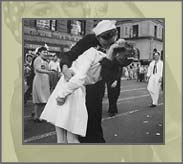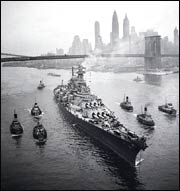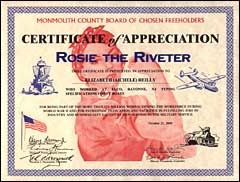| |
The
War Ends

When Germany surrendered, people were overjoyed that the war was
over. On the streets of New York, soldiers and sailors like this
one went around kissing all the girls they could. Photo Credit:
National Archives. |
At the end of
the summer, I started going to school at the Pace Institute in New
York City. I was at school when the armistice
with the Axis
was announced. It was VE (Victory in Europe) Day, May 8, 1945. The
city of New York went WILD! We just walked out of our classes and
watched as people poured out of the buildings. My friends and I
went to Times Square, where people were hugging and kissing strangers,
and it was there we saw three sailors riding on top of a taxi while
other sailors, soldiers, and everybody was just unbelievably happy.
I went with my friends to Central Park and we just sat on the grass,
hardly able to believe that the war in Europe was actually over.
I was at home
on the farm in Staten Island when the Japanese surrendered on September
2, 1945 (VJ — Victory over Japan — Day). At the time,
we did not realize the terrible power of the atomic
bombs we had used to end the war. It took us a while to learn
what exactly happened. The reaction on the farm at the end of the
war was exciting, but it was nothing like being in New York.

The U.S.S. Missouri as she went under the Brooklyn Bridge.
Notice all the boats surrounding her. Photo Credit: Corbis Images. |
The war was
over, but I was still lucky enough to witness another wonderful
part of history. I was on board the Staten Island Ferry, returning
home from school in October 1945, when the ferry passed the U.S.S.
Missouri — the ship on which the Japanese surrender
had been signed. The reception New York Harbor gave the "Mighty
Mo" (The Missouri's nickname) was unbelievable. New York
Harbor had been awaiting the arrival of the ship all day. When she
finally arrived, every horn, every whistle, every bell on every
ship in the harbor went off to greet the "Mo." All the fire boats
shot up huge plumes of water. Every inch of the railings of the
"Mo" was lined with sailors in their whites. It is another bit of
history seared into my memory — I shall never forget it. Now
the U.S.S. Missouri is at anchor in Pearl Harbor, where the
war began.

In October 2000, Betty was honored as a "Rosie the Riveter" in Monmouth
County, New Jersey, and she received this certificate of appreciation.
Image courtesy of Betty Reilly. |
After the war,
I worked as an executive clerk for Hudson Tubes, an underground
train connecting New York and New Jersey below the Hudson River.
I married my fiancÚ, the bomber pilot, in 1948. He returned after
flying 20 missions safely over enemy territory. We divorced 10 years
later. I remarried and have two sons.
Think About
It
Why would Betty, a civilian, feel differently than the soldiers
and sailors she saw?
Read the transcript of our interview with Betty Reilly.

|
|

